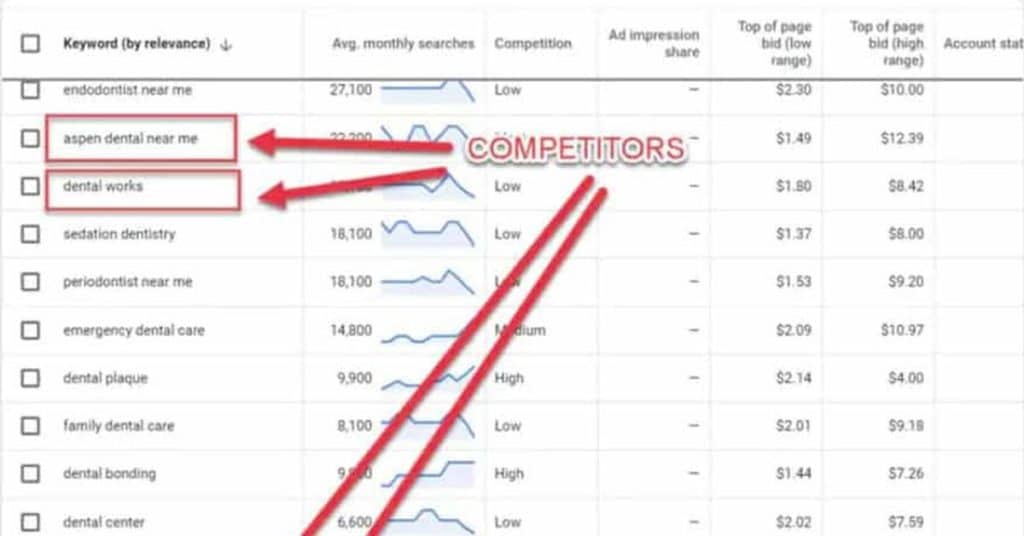Google Ads Campaign Advertising Types
There are two primary ways for local businesses to get more business through google search: Google Smart Campagns, and Google Search Campaigns.
Google Smart Campaigns are campaigns which lean heavily on Google’s algorithms. Advertisers have limited control, and most of the advertising work is done for them.
Google search campaigns require much more work on the part of the advertiser. There is upside however, as the advertiser can potentially achieve a higher return on investment and learn more about their target audience. Depending on your time and experience, you can run a paid search campaign yourself or hire a ppc consultant.
In this writeup – we take a look at the pros and cons of both campaign advertising types and we come up with suggestions on what may work best for your particular situation.
Essential Part of Online Marketing
Note that paid advertising with Google Ads and a sound SEO strategy that includes on-page SEO are the two most effective online marketing methods to generate leads for your business. We implement paid search ads and SEO for almost all of our clients.
Google Smart Campaigns Overview
Google Smart campaigns, (previously called Google Adwords Express) are an easy and fast way to get your ads up and running on Google. A Smart Campaign is a campaign that has your ads automatically created from the information you provide.
You’ll provide your information through a simple and quick 10 step signup process. The whole process (according to Google’s official documents) takes around 15 minutes or less.
You’ll enter the following information:
Keyword Themes
In Google Smart Campaigns, you use “keyword themes” unlike Google Search campaigns. A keyword theme is a bundle of phrases and words that are all related to each other. Google recommends a maximum of 7-10 different keyword themes. You’ll want to choose keyword themes that are similar to searches that you believe people will conduct on Google in order to find your services. In Smart campaigns, these keyword themes are a critical factor in determining whether or not your ads are triggered by users’ searches.
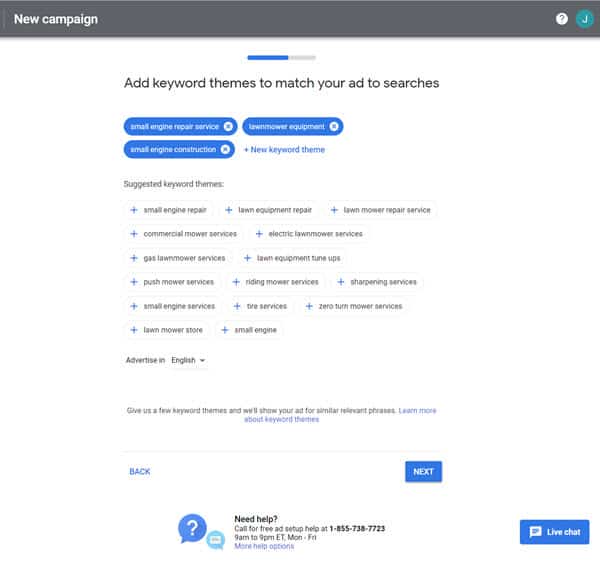
A Landing Page on Your Website
Google will need to have a page on your site to send users to after they click on your ad. In general, this page should be closely related to your search and not the home page. For example, if you’re a full-service bakery running a smart campaign for chocolate cakes, you’ll want to send users to your chocolate cakes page, not your home page.
Content for Ads
Google prefills content for ads which you can modify to create your own custom ads.
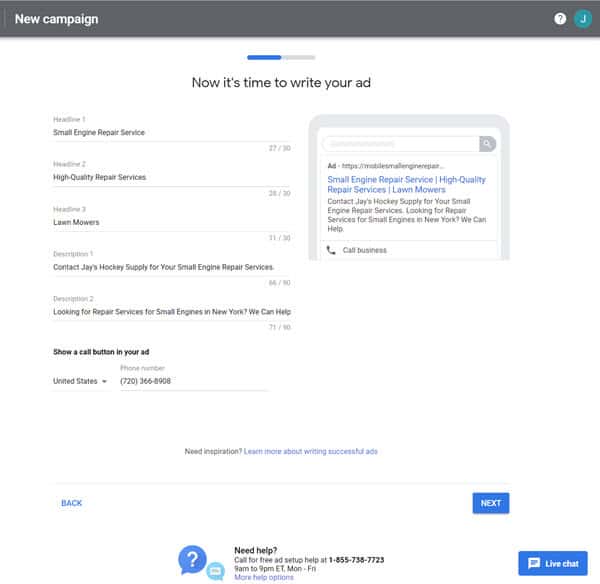
Location
You can select a radius that represents your service area. You can also advertise in specific cities, regions or zip codes.
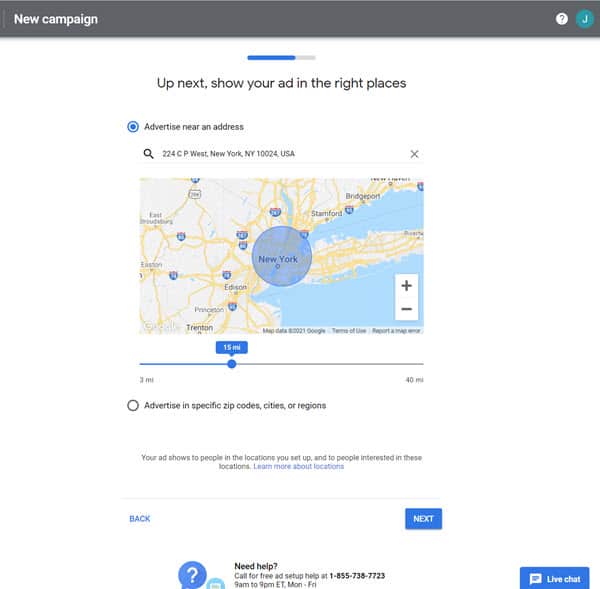
Budget
You’ll have to set up a daily budget that you’re comfortable with.
That’s pretty much it. Once you’re done, you can just sit back and wait for your account to be approved. After your account is approved, Google will create and run your ads for you.
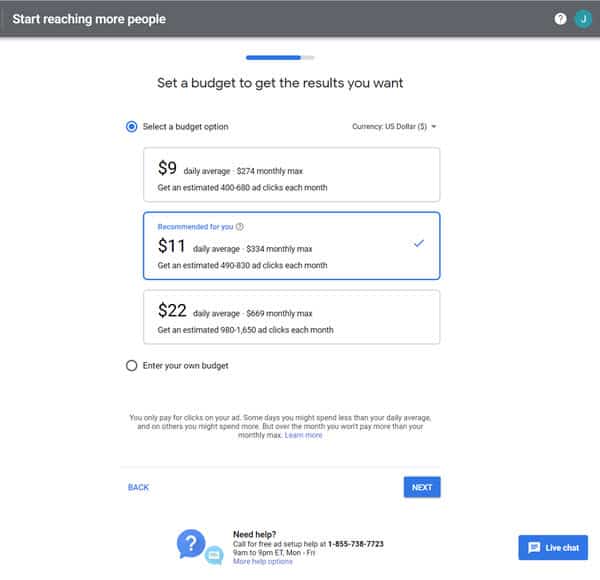
Google Ads Search Campaigns Overview
Signing up for Search Campaigns
Google encourages new users to opt in to Smart Campaigns by default. In order to set up a traditional ads campaign on the search network, you’ll have to click on the “Switch to Expert” mode during the first part of the signup process as shown below.
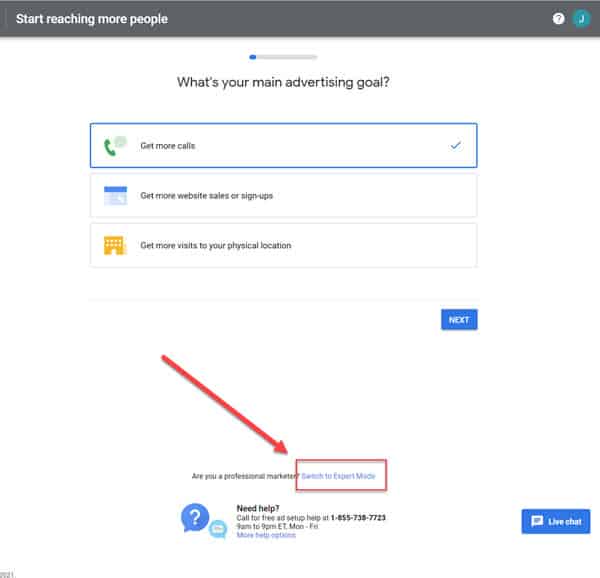
From here, you can either follow the guided process to set up your account or click on “create an account without a campaign” to build your ad account from scratch.
Instead of being led through a largely automated process, you’ll have to set up everything yourself. This usually means that you’ll be able to customize your account more specifically to your needs.
Campaigns
You’ll have the opportunity to create multiple campaigns within your account – just like with smart campaigns.
Ad Groups
You’ll also create ad groups which are focused around a particular theme
Keywords
Unlike keywords themes in Google Smart Campaigns which represent the keywords that Google’s algorithms believe to be relevant, you’ll add individual keywords to your ad groups, and there are multiple keyword match types to choose from. Your ad will be triggered in the search results by the keyword(s) used and the bid you’ve entered.
Ads
You’ll also create multiple ads per each ad group – usually 3 is the recommended number
Budget and Bidding
You have more flexibility with your budget and bidding. For example, just some of the control you have includes modifying your bids based on time of day, day of week, and browser device that the searcher is on.
Location Targeting
Is largely the same as Smart Campaigns, but you can vary your bids based on where the searcher is located. For example, you can bid more for people that are close to you – and bid less for those who are further away.
Advantages of Smart Campaigns vs Search Campaigns
Ad Campaign Setup Time
It is much easier to set up a Smart Campaign in Google than a Search Campaign.
Smart campaigns can be set quickly and you’ll have ads up and running in as little as 15 minutes.
Setting up a search campaign properly can take an entire day or more. In addition, you have to go through large sections of the Google Ads interface or Google Ads Editor to set everything up. This can be a significant difference when setting up multiple campaigns – and managing ads, ad groups, and keywords in a search campaign can be time-consuming and frustrating.
Ad Campaign Management Time
Another advantage of Smart campaigns is the ease of management. You’re allowing Google to do most of the campaign monitoring and management so that you can focus on your business. You’ll probably only have to spend a few hours a month managing your Smart Campaign performance.
Search campaigns will take significantly more time – with campaign management taking up a good chunk of your time each month. You’ll need to be monitoring your search campaigns daily – especially when you first start a campaign to make sure that you’re getting the best performance possible.
You’d be smart to establish a reporting system – either in house or purchased from a third party – that you refer to daily in order to manage your account effectively and make sure that all of your performance goals are being met.
You may also wish to use a third-party service to help with campaign management. Google will make recommendations for your search campaigns, but those recommendations may not always be in line with your goals. You may wish to try out tools like Opteo, AdAlysis, and Optymzr. All can help you by providing a streamlined view of your ad account and search campaigns along with some great performance-based suggestions. There is of course additional cost and time involved in getting these third-party tools to work properly for you.
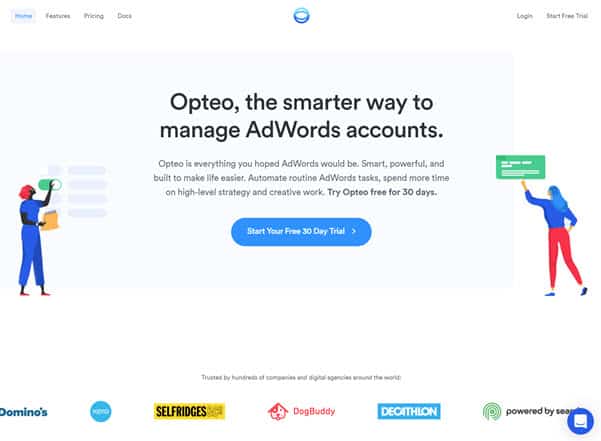
Learning Time
Before setting up and maintaining your own ad campaigns, you’ll have to understand the basic principles of how Google Ads works. You’d be wise to take multiple online courses and then experiment with very small campaigns to make sure your ad campaign is working properly. All of this is another use of your time that could likely be better spent on improving your business.
Disadvantages of Smart Campaigns vs Search Campaigns
The big advantage of Smart Campaigns over Search campaigns was time. It is extremely time-consuming to set up a search campaign properly. However, investing the time in getting your search campaign properly optimized is well worth it. You’ll be able to more easily meet your goals, and you’ll have better control over your ad campaigns.
Below are some of the disadvantages to Smart Campaigns.
Lack of Control of Keywords
Search campaigns have multiple keyword match types, so you have more control over when your ad will be triggered. It is possible that an exact keyword match type like [purple face masks] will provide a great return on investment for an advertiser, whereas the “purple face masks” could actually be a net loss for an advertiser. The reverse could also be true.
The point is that even though the keywords are the same, the match type could result in vastly different performance (in this case based on the words that surround the phrase match).
Smart Campaigns’ keyword themes don’t allow match types. Since Smart Campaigns are a black box, it is unclear that the campaigns are “smart” enough to differentiate the return on investment between different types of search phrases to only focus on triggering ads on phrases that are profitable for the advertiser.
You can use the Search Terms Report within the Smart Campaigns interface to find likely negative keywords and attempt to add them as part of a negative keyword theme – but as we’ll discuss below, it isn’t exactly clear how these negative keyword themes are applied.
Negative Keywords vs Negative Keyword Themes
You can explicitly add a negative keyword to your search campaigns to keep your ads from showing for undesirable searches – which can result in clicks and a lost budget. If you don’t make vegan chocolate cakes, you could use the word “vegan” as a negative keyword to prevent your ads from showing for searches that don’t apply to your business.
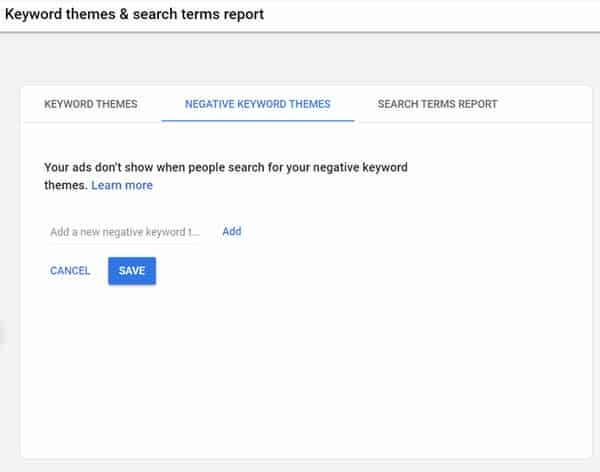
Smart Campaigns have negative keyword themes. It is impossible to tell from the support documentation, but these “themes” don’t appear to have the same functionality as negative keywords in search campaigns. They also may not block irrelevant searches from triggering your ads as well as negative keywords in search campaigns.
Lack of Bidding Control
Keyword Bidding
Smart Campaigns have negative keyword themes. It is impossible to tell from the support documentation, but these “themes” don’t appear to have the same functionality as negative keywords in search campaigns. They also may not block irrelevant searches from triggering your ads as well as negative keywords in search campaigns.
Device Bidding
Search campaigns allow you to bid differently based on the device that the user is searching from. There are situations where you’ll want to bid more for a user that is searching for your services on a mobile phone. A dentist would bid likely bid more on “tooth extractions” for someone searching on their mobile phone than someone who conducts the same search on their tablet. The mobile phone user likely has an emergency situation and can easily click a button and make contact. The tablet searcher would be less likely to have an urgent need, and you would likely bid less for this searcher.
Location Bidding
With search campaigns, you can bid different amounts based on the searcher’s location. Smart Campaigns don’t support this. If you have a retail store and want to bid more for customers that are close to you, this isn’t possible.
Lack of Industry Knowledge
The fact that you get a lot more data with search campaigns means that you’ll get a better overall understanding of what keywords and ads resonate best with your target audience.
Best Tips for Winning Smart Campaigns
While Smart Campaigns are specifically designed to pretty much run themselves, there are a few things that you can do to try to improve your performance
Tight Keyword Themes
Make sure you have tight keyword themes – don’t confuse Google’s algorithms by going too broad with your themes. If you have services or products that are unrelated, create another campaign with a separate keyword theme.
Search Terms Report
Be sure to check your search terms report. This will help you to narrow or expand your theme (or create a new Smart Campaign). You can also use your search terms report to add new negative keyword themes to block irrelevant searches from triggering your ads.
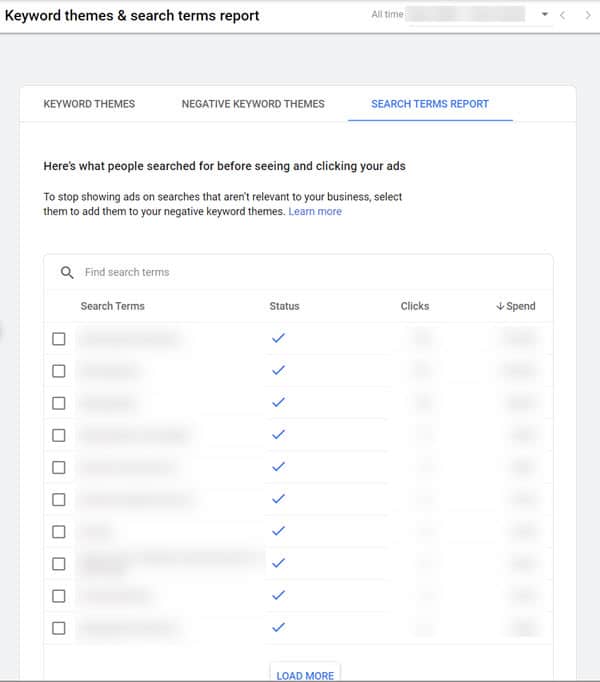
Ad Scheduling
Set up your ad schedule to only show ads when you have people that can field incoming leads. You don’t want to waste money on ads and clicks when someone can’t effectively contact you.
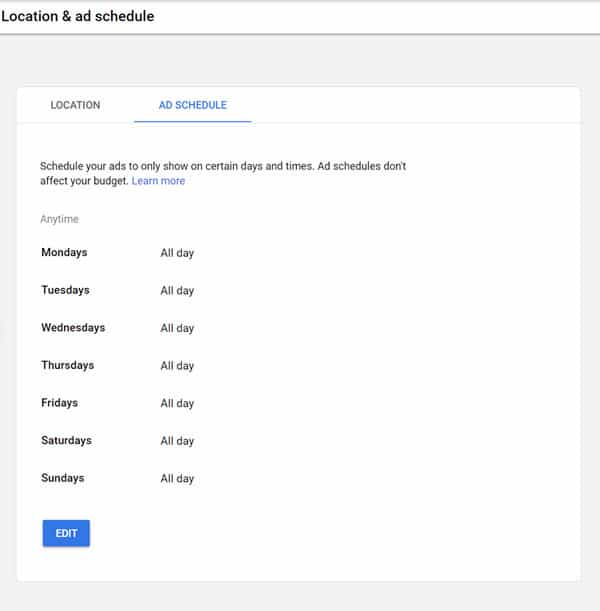
Which Ads Strategy Should You Use:
Smart Campaigns or Search Campaigns?
Smart Campaigns work best for businesses that:
- Don’t have a lot of time to manage their campaigns
- Are generally smaller businesses with very few employees
- Don’t yet have the budget to hire a marketing agency
- Have lower advertising budgets
Search Campaigns work best for businesses that:
- Have larger budgets
- Have in-house marketing staffs – or the ability to hire an outside agency
- Have a greater need to understand their target market – by determining what keywords, ads and searches resonate with their customers
- Would prefer to have greater control of ad campaigns rather than leaving it up to Google Algorithms
- Feel uneasy about letting an advertising platform have management control of their ad campaigns (as the ad platform may be adjusting bids of their company and that company’s direct competitors)
Smart Campaigns may be a good fit if you want to experiment with online advertising. You can mitigate your risk by having tightly themed keywords and a low daily budget.
I’m a big proponent of experimenting with different forms of advertising. If you have great success with Smart Campaigns and are getting a solid ROI, then keep rolling with Smart Campaigns. If your results are lacking, or if your business is growing to the point where you’re outgrowing Smart Campaigns, then it may be time to experiment with search campaigns.
Other Google Tools To Promote Your Business
In addition to paid advertising, Google offers other ways to promote your business that small business owners should definitely take advantage of. Smaller businesses should take advantage of the absolutely free Google My Business Website Builder. Additionally, local businesses should be sure to get a Google My Business Listing to increase their presence on the web.
